from Apr. 22, 1865
Excerpts from the Letters and diary of Laura M. Towne
-
Full Title
Excerpts from the Letters and diary of Laura M. Towne
-
Description
Laura M. Towne was an abolitionist and an educator. Before the Civil War, Towne was studying medicine but was motivated to become an abolitionist after the outbreak of the Civil War. Towne volunteered when the Union captured Port Royal and other Sea Islands area of South Carolina. She and her friend, Ellen Murray, founded the Penn Center on St. Helena Island, the first school for freed slaves. Her diaries and letters from this time were edited by Rupert Sargent Holland and published in 1912.
-
Transcription
The gardens are gay with jonquils and “daffies,” and the jessamine is nearly in full bloom.
The bell — when will that come? A golden opportunity will be gone if it does not come this week! Our schoolhouse is being shingled now, and if the Government carpenter goes we shall probably have to pay for it, or I shall. It is my affair.
Charleston, S.C., April 14, 1865.
I have seen the same old flag raised on Sumter by General Anderson himself,1 Garrison,2 George Thompson, Tilton, Beecher,3 and a host of abolitionists being present. It was a most beautiful and glorious sight…
Village, St. Helena, S.C., April 23, 1865.
We did go to Charleston to that great celebration, and on the very day that vile assassin was doing his work, or had accomplished it.4 Such shouts and cheers went up for Lincoln from the freed people of Charleston, at the mention of his name by Garrison at the great meeting in Zion Church, that it must have done him good even in his death. I never saw such enthusiasm as they showed every time he was mentioned. On the island here they are inconsolable and will not believe he is dead. In the church this morning they prayed for him as wounded but still alive, and said that he was their Saviour — that Christ saved them from sin, and
1. The United States flag was raised on Fort Sumter in Charleston Harbor on April 14, 1865, by General Robert Anderson, who had been compelled to surrender the same fort four years before.
2. Willian Lloyd Garrison.
3. Henry Ward Beecher.
4. Abraham Lincoln was assassinated April 14, 1865.
----------------------------------
he from “Secesh,” and as for the vile Judas who had lifted his hand against him, they prayed the Lord the whirlwind would carry him away, and that he would melt as wax in the fervent heat, and be driven forever from before the Lord. Was n’t it the cunning of the Devil that did the deed; and they are going to prove him insane! When he was wise enough to strike the one in whom all could trust, and whose death would inevitably throw confusion and doubt into the popular mind of the North! And then to single out Seward2 in hopes that the next Secretary might embroil us with Europe and so give them another chance! It is so hard to wait a week or two before we know what comes next.
But I must tell you of our trip to Charleston. General Saxton gave us all passes, and a large party of teachers went from this island with Mr. Ruggles — good, kind, handsome fellow — to escort us. We stayed at a house kept by the former servants or slaves of Governor Aiken.
I was dreadfully seasick going up, and the day after I got there had to go to bed, and so I missed seeing many things I should have liked to visit. It stood — the house we stayed at —in the very heart of the shelled part of the city, and had ever so many balls through it. The burnt part of the town is the picture of desolation, and the detested “old sugar-house,” as the workhouse was called, looks like a giant in his lair. It was where all the slaves were whipped, and the whipping-room was made with double walls filled in with sand so that the cries could not be heard in the street. The treadmill and all
2 An attempt was also made to assassinate Secretary State Seward.
--------------------------------------------
kinds of tortures were inflicted there. I wanted to make sure of the building and asked an old black woman in that was the old sugar-house. “Dat’s it,” she said, “but it’s all played out now.” On Friday we went to Sumter, got good seats in the amphitheatre inside, near the pavilion for the speakers, and had a good opportunity to see all. I think there was not that enthusiasm in Anderson that I expected, and Henry Ward Beecher addressed himself to the “citizens of Charleston,” when there were not a dozen there. He spoke very much by note, and quite without fire.
At Sumter I bought several photographs, and send you one of the face [of the fortress] farthest from Wagner, Gregg, and our assailing forts, and consequently pretty well preserved. If you look closely you will see rows of basket-work, filled with sand, repairing a break. The whole inside of the fort is lined with them.
The next day was the grand day, however, when Wilson, Garrison, Thompson, Kelly, Tilton, and others spoke. Redpath mentioned John Brown’s name, and asked the great congregation to sing his favorite hymn, “Blow ye the Trumpet,” or “Year of Jubilee.”
I spoke to Judge Kelly afterwards and had a nice promise from him that he would send me all his speeches. We came home on Sunday and found all the missing boxes arrived,— or nearly all,— among them, mine. You do not know how intensely we all enjoy your picture—that exquisite sea-view. How could you spare me such a picture! I lie down on our sofa which faces it, and do so heartily enter into the freshness of it that it is refreshing in this hot weather. Many thanks to you.
------------------------------------------------
[The next letter refers to the death of President Lincoln.]
Saturday, April 29, 1865.
… It was a frightful blow at first. The people have refused to believe he was dead. Last Sunday the black minister of Frogmore said that if they knew the President were dead they would mourn for him, but they could not think that was the truth, and they would wait and see. We are going to-morrow to hear what further they say. One man came for clothing and seemed very indifferent about them — different from most of the people. I expressed some surprise. “Oh,” he said, “I have lost a friend. I don’t care much now about anything.” “What friend?” I asked, not really thinking for a moment. “They call him Sam,” he said; “Uncle Sam, the best friend ever I had.” Another asked me in a whisper if it were true that the “Government was dead.” Rina says she can’t sleep for thinking how sorry she is to lose “Pa Linkum.” You know they call their elders in the church—of the particular one who converted and received them in — their spiritual father, and he has the most absolute power over them. These fathers are addressed with feat and awe as “Pa Marcus,” “Pa Demas,” etc. One man said to me, “Lincoln died for we, Christ died for we, and me believe him de same mans,” that is, they are the same person.
We dressed our school-house in what black we could get, and gave a shred of crape to same of our children, who wear it sacredly. Fanny’s bonnet supplied the whole school.
[Transcription by: Grace C., Dr. Susan Corbesero’s Class, Ellis School, Pittsburgh, Pennsylvania] -
Source
-
Rights
This item is in the public domain and may be reproduced and used for any purpose, including research, teaching, private study, publication, broadcast or commercial use, with proper citation and attribution.
-
Tags
-
Cite this Item
Laura M. Towne. "Excerpts from the Letters and diary of Laura M. Towne". Cambridge, Printed at the Riverside Press,. Remembering Lincoln. Web. Accessed July 7, 2025. https://rememberinglincoln.fords.org/node/1194
-
Creator
Laura M. Towne
-
Publisher
Cambridge, Printed at the Riverside Press,
-
Date
April 22, 1865
from Apr. 22, 1865
Excerpts from the Letters and diary of Laura M. Towne
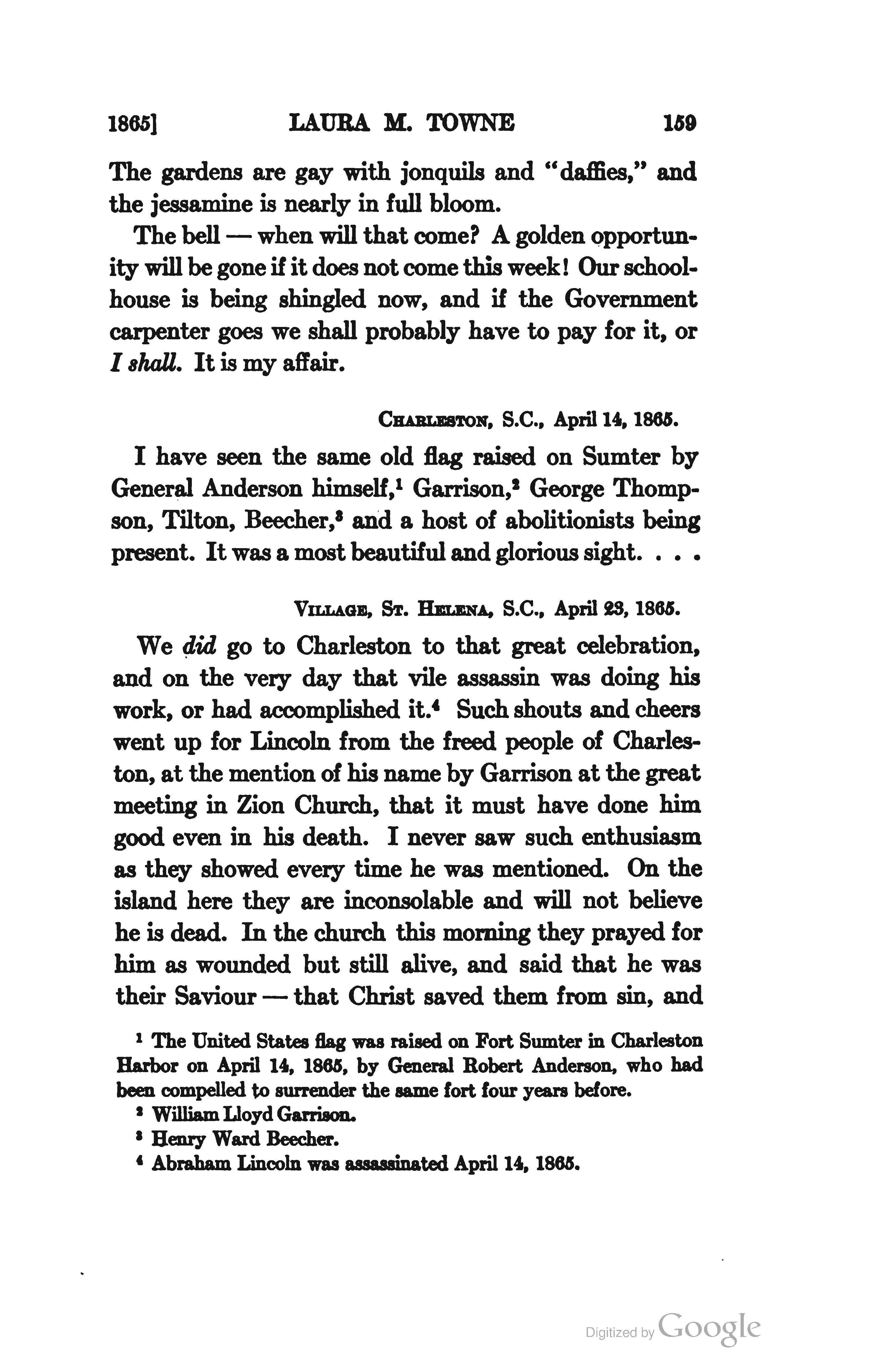
-
Description
Laura M. Towne was an abolitionist and an educator. Before the Civil War, Towne was studying medicine but was motivated to become an abolitionist after the outbreak of the Civil War. Towne volunteered when the Union captured Port Royal and other Sea Islands area of South Carolina. She and her friend, Ellen Murray, founded the Penn Center on St. Helena Island, the first school for freed slaves. Her diaries and letters from this time were edited by Rupert Sargent Holland and published in 1912.
-
Source
-
Rights
This item is in the public domain and may be reproduced and used for any purpose, including research, teaching, private study, publication, broadcast or commercial use, with proper citation and attribution.
-
Creator
Laura M. Towne
-
Publisher
Cambridge, Printed at the Riverside Press,
-
Date
April 22, 1865
from Jul. 16, 1865
John Bigelow Diary Entry
-
Full Title
John Bigelow Diary Entry
-
Description
John Bigelow was an American author, editor and diplomat. In 186, Abraham Lincoln appointed Bigelow as United States Consul becoming Chargé d'Affaires at Paris, France, as Minister to the Court of Napoleon III. In 1865, he was appointed American Ambassador to France. He sporadically kept a diary during this time and following a months long gap beginning in early April 1865. He returned to writing in July and notes the greatest change over the last few months being the Lincoln assassination.
-
Transcription
“John Bigelow Diary Entry”
Sunday July 16^[[th]]. 1865. 81
It is now the months & more since I have touched my
journal and what an inconsistency on my hart, The
three most eventful months of my life. I have elected
into my [[functions]] [[hae]] as Minister Plen; Prest. Lincoln had
been assassinated ; a man who If me or you [[best guess]] had followed
a dispace to the country , and as Vice Prest. a national ealamily
has becomes President ; this man is now generally
believed to be a much more competent President
for the coming emergencies ; The war is ended and
the rebels are coming in by hundreds to make them
reach with the [[good]]. all satisfied That they had made
a great mistake; Ms. Bigelow has gone home
on a visit with Jenny, I have father Mario [[dfrise`s]] hotel
in the Rue des [[Ballims]] 91°19 at 21000 for a year, hace
ordered [[Bander]] to make me a [[Berfine]] and to repair
my Coupé at an aggregate expense of who boosts, and
last might accepted [[F Asterach]] proportional to find
me a fine than of horses which he says he wil
be glad to do at a bargain out of gratitude.
[Transcription by: Alexis Ennis, Rachel Engl’s class, Lehigh University.] -
Source
Manuscripts and Archives Division, The New York Public Library
-
Rights
This item is in the public domain and may be reproduced and used for any purpose, including research, teaching, private study, publication, broadcast or commercial use, with proper citation and attribution.
-
Tags
-
Cite this Item
John Bigelow. "John Bigelow Diary Entry". Remembering Lincoln. Web. Accessed July 7, 2025. https://rememberinglincoln.fords.org/node/1190
-
Creator
John Bigelow
-
Date
July 16, 1865
from Jul. 16, 1865
John Bigelow Diary Entry
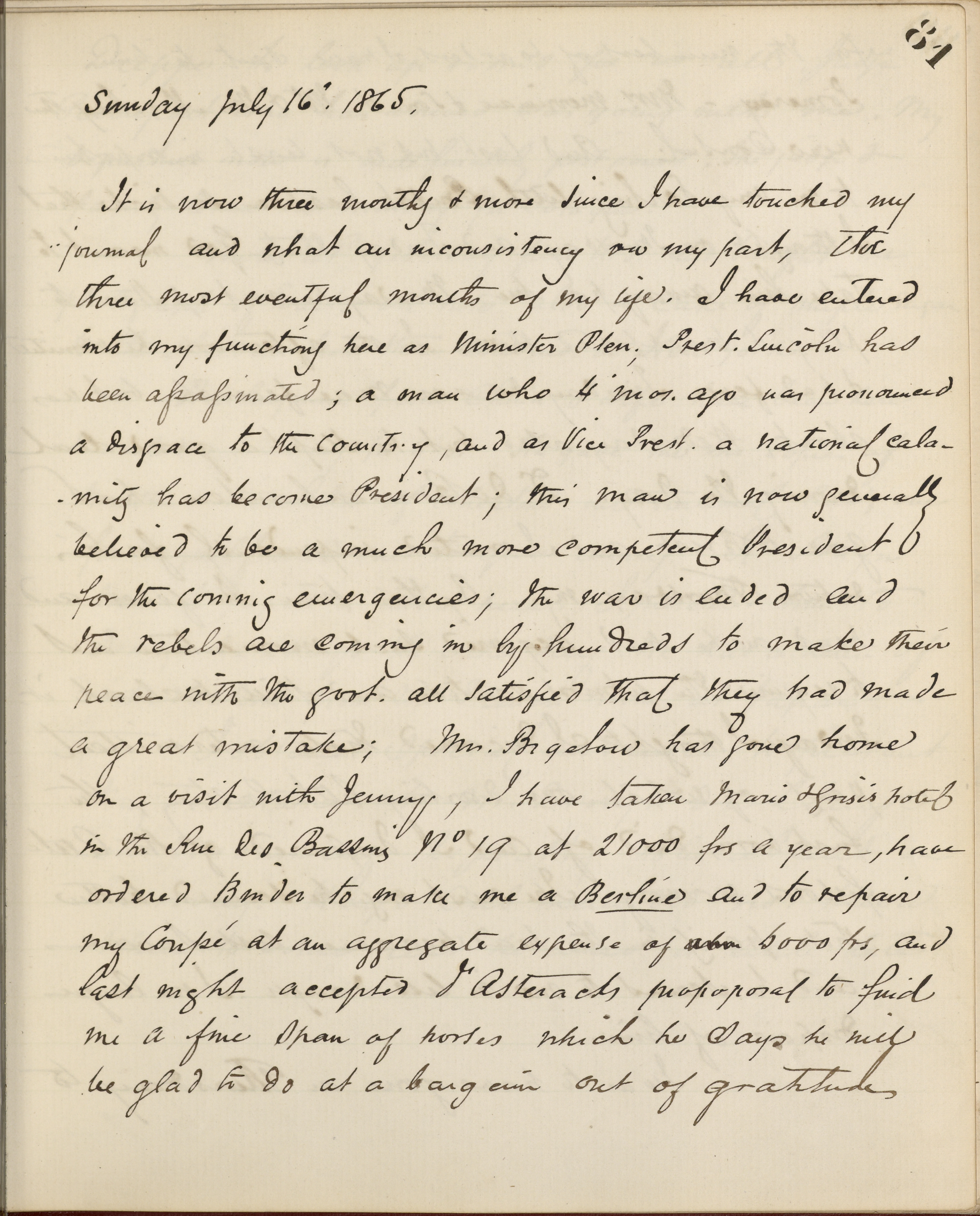
-
Description
John Bigelow was an American author, editor and diplomat. In 186, Abraham Lincoln appointed Bigelow as United States Consul becoming Chargé d'Affaires at Paris, France, as Minister to the Court of Napoleon III. In 1865, he was appointed American Ambassador to France. He sporadically kept a diary during this time and following a months long gap beginning in early April 1865. He returned to writing in July and notes the greatest change over the last few months being the Lincoln assassination.
-
Source
Manuscripts and Archives Division, The New York Public Library
-
Rights
This item is in the public domain and may be reproduced and used for any purpose, including research, teaching, private study, publication, broadcast or commercial use, with proper citation and attribution.
-
Creator
John Bigelow
-
Date
July 16, 1865
from Apr. 15, 1865
Susan B. Anthony's Diary
-
Full Title
Susan B. Anthony's Diary
-
Description
Susan B. Anthony was a women's rights activist and suffragette. Before and during the Civil War, she was also heavily involved in the anti-slavery movement. She wrote about the Lincoln assassination in her diary after she learned of the news on April 15th and over the following days.
-
Source
Library of Congress, Manuscript Division, Susan B. Anthony Papers
-
Rights
This item is in the public domain and may be reproduced and used for any purpose, including research, teaching, private study, publication, broadcast or commercial use, with proper citation and attribution.
-
Tags
-
Cite this Item
Susan B. Anthony. "Susan B. Anthony's Diary". Remembering Lincoln. Web. Accessed July 7, 2025. https://rememberinglincoln.fords.org/node/1189
-
Creator
Susan B. Anthony
-
Date
April 15, 1865
from Apr. 15, 1865
Susan B. Anthony's Diary

-
Description
Susan B. Anthony was a women's rights activist and suffragette. Before and during the Civil War, she was also heavily involved in the anti-slavery movement. She wrote about the Lincoln assassination in her diary after she learned of the news on April 15th and over the following days.
-
Source
Library of Congress, Manuscript Division, Susan B. Anthony Papers
-
Rights
This item is in the public domain and may be reproduced and used for any purpose, including research, teaching, private study, publication, broadcast or commercial use, with proper citation and attribution.
-
Creator
Susan B. Anthony
-
Date
April 15, 1865
from Jun. 1, 1865
Excerpt from The War-time Journal of a Georgia girl, 1864-1865
-
Full Title
Excerpt from The War-time Journal of a Georgia girl, 1864-1865
-
Description
Eliza Frances Andrews was born in Washington, Georgia in 1840. Her father was a prominent judge and planter. While her parents supported the Union, she and her three brothers supported the Confederacy. Her journal begins with her journey to Macon, Georgia in December 1864 to meet relatives with whom she would stay until the War ended. Her journal was heavily edited and published 40 years later. However, it gives insight into Andrews reaction to the Lincoln Assassination and to his memorial on June 1, 1865.
-
Transcription
The War-time Journal of a Georgia girl 1864 dash 1865 by Eliza Frances Andrews
… Secessionists,” he used to call them, when angry or heated By contradiction, but more commonly, “the poor fools,” in a tone of half-pitying rebuke, just as he had spoken of them on that memorable night when the bells were ringing for the secession of his State.
It was probably his warmth in advocating this policy to “agree with the adversary quickly” lest a worse thing should befall us by delay, that led to his action at the public meeting referred to in the text. What was said and done on that occasion, and the substance of the resolutions that gave such offense, I know no more to this day than when the account in the journal was penned. The subject was never alluded to between us and our father. Whether the course of events would have been altered if councils such as his had prevailed, no one can tell. The passion and fury of the time were not favorable to moderation, and the fatal mistake was made, that has petrified the fifteenth amendment in our national constitution comma and injected a race problem into our national life. There it stands to-day, a solid wedge of alien material cleaving the heartwood of our nation's tree of life, and throwing the dead weight of its impenetrable mass on whatever side its own interests or passion, or the influence of designing politicians may direct it.
June 1, Thursday. –I dressed up in my best, intending to celebrate the Yankee fast by going out to pay some call, but I had so many visitors at home that I did not get out till late in the afternoon. I’m sorry enough that Lincoln was assassinated, Heaven knows, but in this public fast is a political scheme gotten up to throw reproach on the South comma and I wouldn't keep it if I were ten times as sorry as I am.
The “righteous Lot” Has come back to town. It is uncertain whether he or Capt. Schaeffer is to reign over us; we hope the latter. He is said to be a very gentlemanly-looking person, and above associating with negroes. his men look cleaner than the other garrison, but Garnett saw one of them with a lady’s gold bracelet on his arm, which shows what they are capable of. I never look at them, but always turn away my head, or pull down my veil when I meet any of them period the streets are so negroes That I don't like to go out when I can help it, though they seem to be behaving better about Washington than in most other places. Capt. Schaeffer does not encourage them in leaving their Masters, still, many of them try to play at freedom, and give themselves airs that are exasperating. The last time I went on the street, two great, strapping wenches forced me off the sidewalk. I could have raised a row by calling for protection from the first Confederate I met, or making complaint at Yankee headquarters, but would not stoop to quarrel with negroes. If the question had to be settled By these Yankees who are in the South comma and see the working of things, I do not believe emancipation would be forced on us in such a hurry; but unfortunately, the government is in the hands of a set of crazy abolitionists, who will make a pretty mess, meddling with things they know nothing about. Some of the Yankee generals have already been converted from their abolition sentiments, and it is said that Wilson is deviled all by out of his life by the negroes in South-West Georgia. In Atlanta, Judge Irvin says he saw the corpses of two dead negroes kicking about the streets unburied, waiting for the public ambulance to come and cart them away.
June 4, Sunday. –Still another batch of Yankees comma and one of them preceded to distinguish himself at once, by “capturing” a negro's watch. They carry out their principles by robbing impartially, without regard to “race, color, or previous condition.” ’Ginny Dick had kept his watch and chain hid ever since the bluecoats put forth this act of philanthropy, and George Palmer's old Maum Betsy said that she has “knowned white folks all her life, an’ some mighty mean ones, but Yankees is de fust ever she seed mean enough to steal fum niggers.” Everybody suspected that mischief was afoot, as soon as the Yankees began coming in such force, and they soon fulfilled expectations by going to the bank and seizing $100,000 in specie belonging to the Virginia banks, which the Confederate calvarymen had restored as soon as they found it was private property. They then arrested the Virginia bank officers, and went about town “pressing” people’s horses to take them to Danburg, to get the “robbers” and the rest of the money, which they say is concealed there. One of the men came to our house after supper, while we were sitting out on…
[Transcription by Quoc T., Ford’s Theatre Society.]
-
Source
Lincoln Financial Foundation Collection via The Internet Archive
-
Rights
This item is in the public domain and may be reproduced and used for any purpose, including research, teaching, private study, publication, broadcast or commercial use, with proper citation and attribution.
-
Tags
-
Cite this Item
Eliza Frances Andrews. "Excerpt from The War-time Journal of a Georgia girl, 1864-1865". New York : D. Appleton and Company. Remembering Lincoln. Web. Accessed July 7, 2025. https://rememberinglincoln.fords.org/node/1188
-
Creator
Eliza Frances Andrews
-
Publisher
New York : D. Appleton and Company
-
Date
June 1, 1865
from Jun. 1, 1865
Excerpt from The War-time Journal of a Georgia girl, 1864-1865
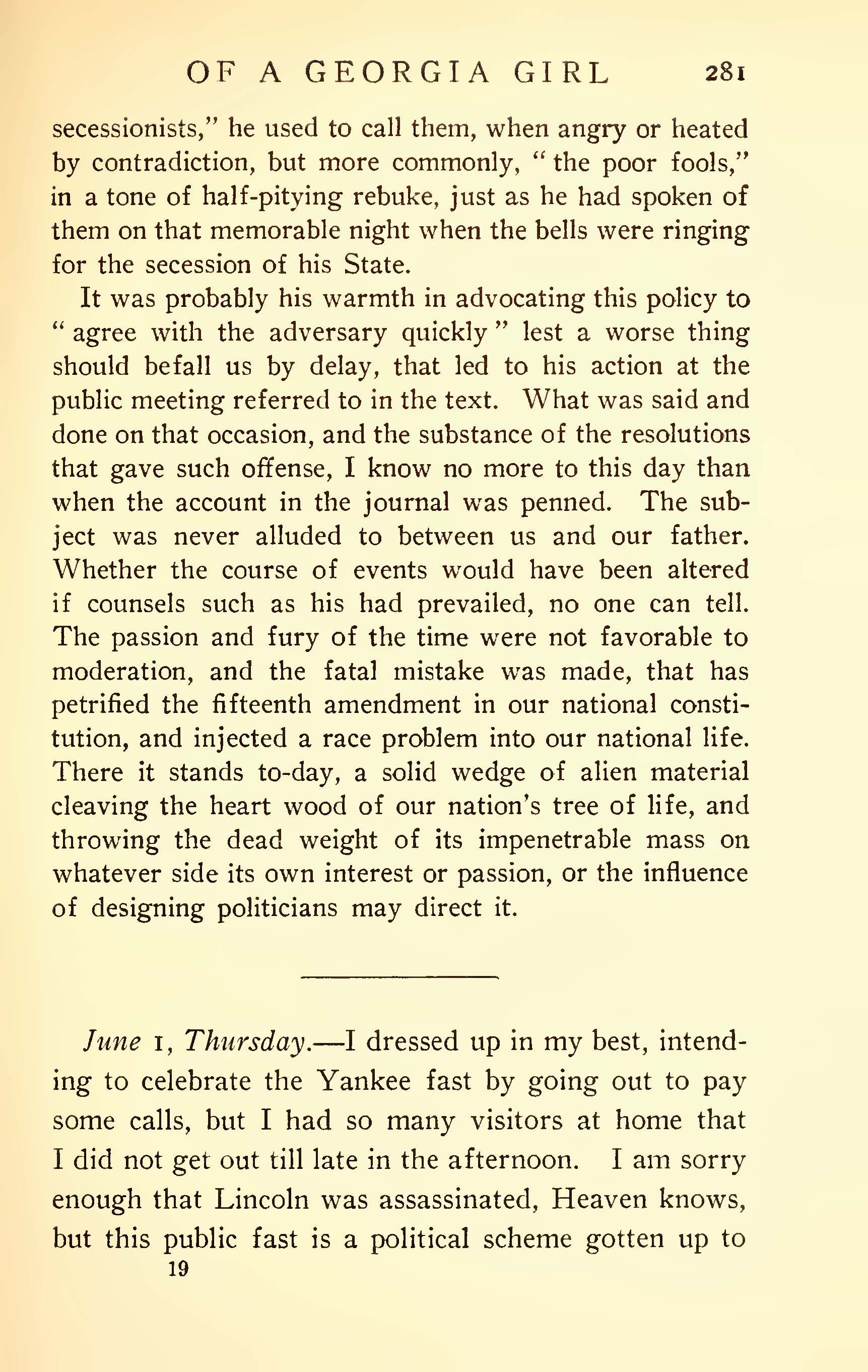
-
Description
Eliza Frances Andrews was born in Washington, Georgia in 1840. Her father was a prominent judge and planter. While her parents supported the Union, she and her three brothers supported the Confederacy. Her journal begins with her journey to Macon, Georgia in December 1864 to meet relatives with whom she would stay until the War ended. Her journal was heavily edited and published 40 years later. However, it gives insight into Andrews reaction to the Lincoln Assassination and to his memorial on June 1, 1865.
-
Source
Lincoln Financial Foundation Collection via The Internet Archive
-
Rights
This item is in the public domain and may be reproduced and used for any purpose, including research, teaching, private study, publication, broadcast or commercial use, with proper citation and attribution.
-
Creator
Eliza Frances Andrews
-
Publisher
New York : D. Appleton and Company
-
Date
June 1, 1865
from May. 1, 1865
O.J. Benham typescript diary
-
Full Title
O.J. Benham typescript diary
-
Description
The typescript copy of O.J. Benham's diary. Benham was a soldier in the Fourth Corps of the Army of the Cumberland. The diary spans February 24, 1865 to June 15, 1865, covering his time in the army. Along with his daily activities, he recorded news and rumors, including the news of the President's Assassination.
-
Source
the Duke University Libraries Digital Collections and the Duke Digital Repository
-
Rights
This item is in the public domain and may be reproduced and used for any purpose, including research, teaching, private study, publication, broadcast or commercial use, with proper citation and attribution.
-
Tags
-
Cite this Item
O.J. Benham. "O.J. Benham typescript diary". Remembering Lincoln. Web. Accessed July 7, 2025. https://rememberinglincoln.fords.org/node/1187
-
Creator
O.J. Benham
-
Date
April 1865
from May. 1, 1865
O.J. Benham typescript diary
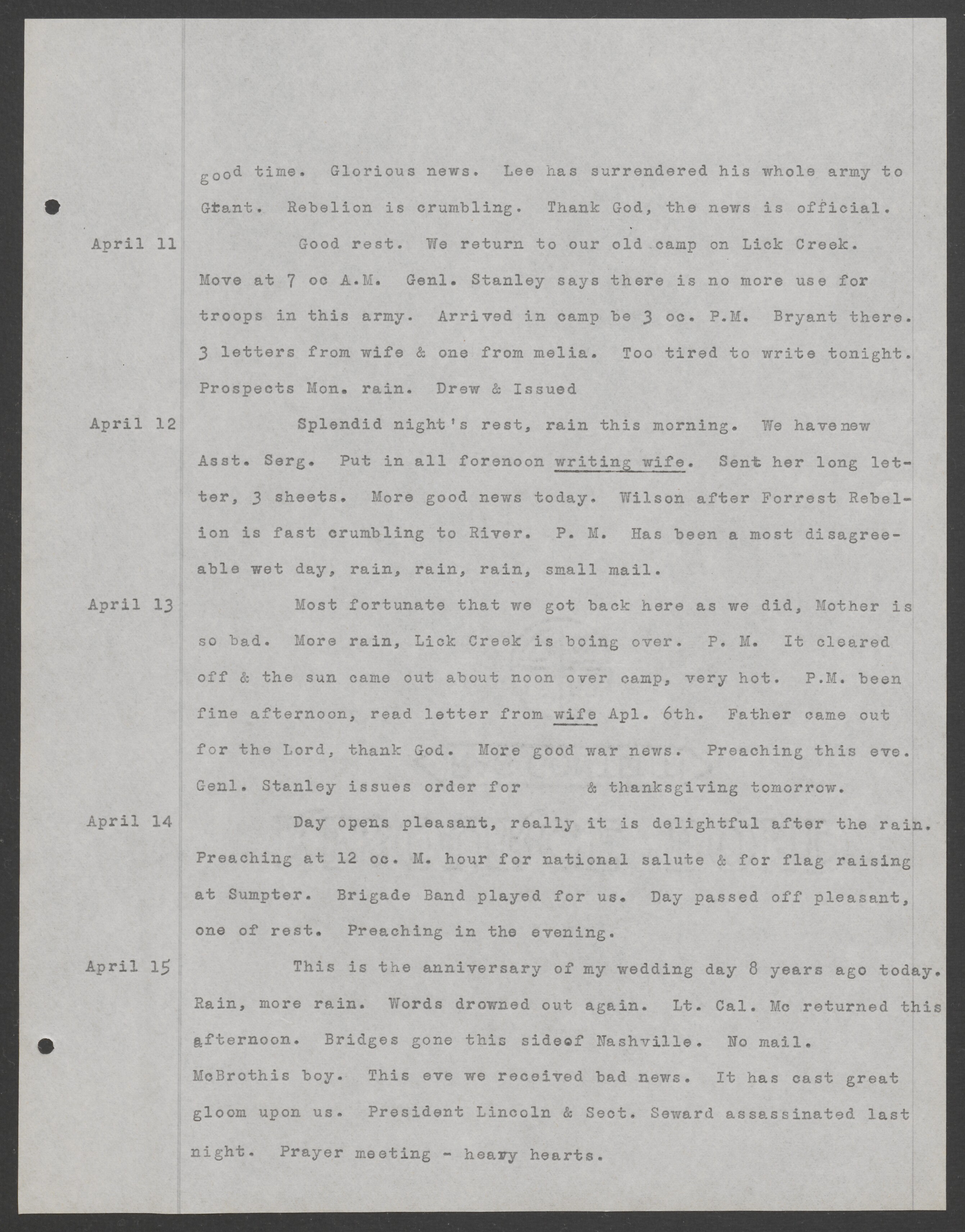
-
Description
The typescript copy of O.J. Benham's diary. Benham was a soldier in the Fourth Corps of the Army of the Cumberland. The diary spans February 24, 1865 to June 15, 1865, covering his time in the army. Along with his daily activities, he recorded news and rumors, including the news of the President's Assassination.
-
Source
the Duke University Libraries Digital Collections and the Duke Digital Repository
-
Rights
This item is in the public domain and may be reproduced and used for any purpose, including research, teaching, private study, publication, broadcast or commercial use, with proper citation and attribution.
-
Creator
O.J. Benham
-
Date
May 1, 1865
from May. 1, 1865
Journal of Elon Lee
-
Full Title
Journal of Elon Lee
-
Description
Elon Lee was a student at the Old University of Chicago in the 1860s. Lee wrote extensively in his journal and to his family about the Lincoln assassination and funeral, which he attended in Chicago
-
Source
Special Collections Research Center, University of Chicago Library
-
Rights
This item is in the public domain and may be reproduced and used for any purpose, including research, teaching, private study, publication, broadcast or commercial use, with proper citation and attribution.
-
Tags
-
Cite this Item
Elon Lee. "Journal of Elon Lee". Remembering Lincoln. Web. Accessed July 7, 2025. https://rememberinglincoln.fords.org/node/1185
-
Creator
Elon Lee
-
Date
April-May 1865
from May. 1, 1865
Journal of Elon Lee
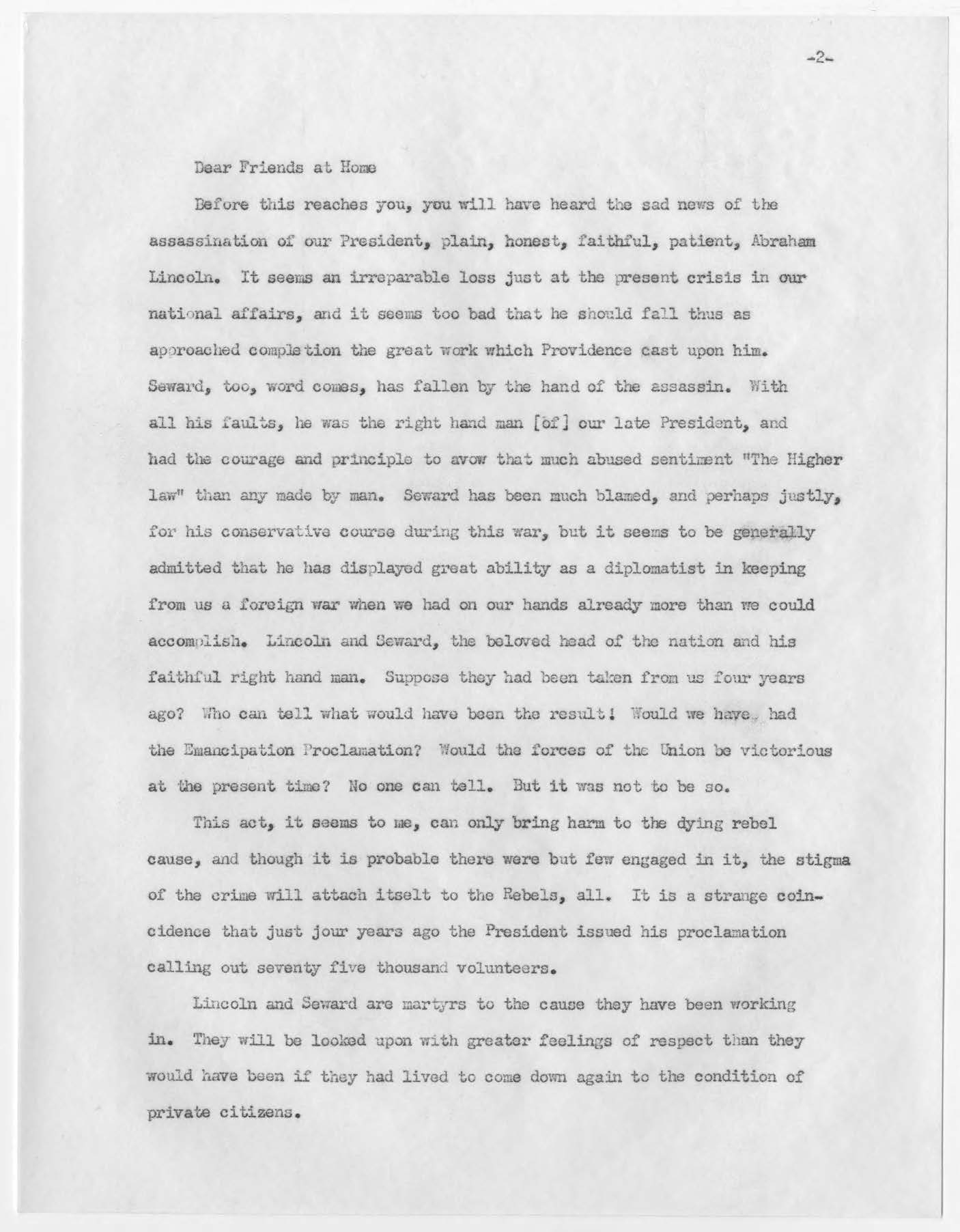
-
Description
Elon Lee was a student at the Old University of Chicago in the 1860s. Lee wrote extensively in his journal and to his family about the Lincoln assassination and funeral, which he attended in Chicago
-
Source
Special Collections Research Center, University of Chicago Library
-
Rights
This item is in the public domain and may be reproduced and used for any purpose, including research, teaching, private study, publication, broadcast or commercial use, with proper citation and attribution.
-
Creator
Elon Lee
-
Date
May 1, 1865
from May. 1, 1865
Excerpt from The Diary of Michael Shiner
-
Full Title
Excerpt from The Diary of Michael Shiner
-
Description
Diarist, Michael Shiner, was an African-American Navy Yard worker who chronicled events in Washington D.C over 60 years.
-
Transcription
and the Hon Abraham Lincoln with them.
and 1865
The Hon abraham Lincoln was assinated assanated on the 14 of April on good friday knight at fords theater in washing
and he died on the 15 of april 1865 on Satturday
and on friday evening before he was assanated Mr Licoln and his Lady whear Both down at the washington navy on good friday the 14 1865 -
Source
-
Rights
This item is in the public domain and may be reproduced and used for any purpose, including research, teaching, private study, publication, broadcast or commercial use, with proper citation and attribution.
-
Tags
-
Cite this Item
Michael Shiner. "Excerpt from The Diary of Michael Shiner ". Remembering Lincoln. Web. Accessed July 7, 2025. https://rememberinglincoln.fords.org/node/1170
-
Creator
Michael Shiner
-
Date
April 1865
from May. 1, 1865
Excerpt from The Diary of Michael Shiner
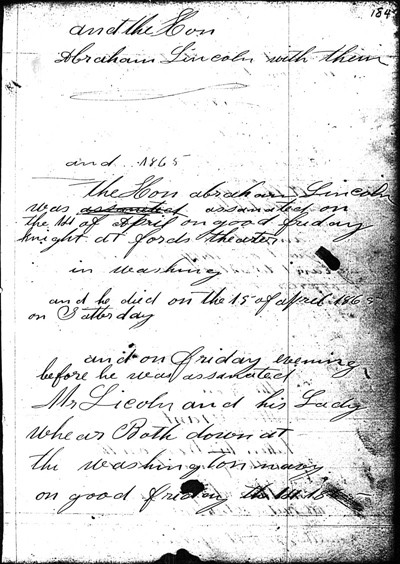
-
Description
Diarist, Michael Shiner, was an African-American Navy Yard worker who chronicled events in Washington D.C over 60 years.
-
Source
-
Rights
This item is in the public domain and may be reproduced and used for any purpose, including research, teaching, private study, publication, broadcast or commercial use, with proper citation and attribution.
-
Creator
Michael Shiner
-
Date
May 1, 1865
from Apr. 14, 1865
Horatio Nelson Taft Diary, April 6-14, 1865
-
Full Title
Horatio Nelson Taft Diary, April 6-14, 1865
-
Description
This excerpt from the diary of Horatio Nelson Taft is an insight into some of the first reactions of citizens of the Union to the death of President Lincoln. Taft, who was a patent clerk, laments Lincoln's teach and denounces the assassination as assassination at it's worst. In the entry just prior to the excerpt describing Lincoln's death, Taft described the return of Lincoln to Washington after a Union victory.
-
Transcription
April 6th 1865
Mr Lincoln has been in Richmond. Near half of the City has been destroyed by fire by the
Rebels themselves as they evacuated it. Large numbers of prisoners have been captured
by Sheridan, Genl Ewell and his Corps, some seven thousand.
April 9, 1865
Genl Lee has surrendered to Genl Grant with his whole Army!! Mr Lincoln has returned to
Washington as in fine Spirits at the prospect of a speedy peace. It is thought that Johnson
and the other rebel Genls will give up now that Lee has surrendered.
April 14th ½ past 10 o'clock P.M.
O, fatal day. O, noble Victim.
Treason has done its worst.
The President has been Assassinated.
It has just been announced at my door
that he was shot a half hour ago at Fords Theatre.
Is it possible?
I have just come from near the scene,
it is too True. 11, o'clock P.M. -
Source
memory.loc.gov
-
Rights
This item is in the public domain and may be reproduced and used for any purpose, including research, teaching, private study, publication, broadcast or commercial use, with proper citation and attribution.
-
Tags
-
Cite this Item
Horatio Nelson Taft. "Horatio Nelson Taft Diary, April 6-14, 1865". Remembering Lincoln. Web. Accessed July 7, 2025. https://rememberinglincoln.fords.org/node/1107
from Apr. 14, 1865
Horatio Nelson Taft Diary, April 6-14, 1865

-
Description
This excerpt from the diary of Horatio Nelson Taft is an insight into some of the first reactions of citizens of the Union to the death of President Lincoln. Taft, who was a patent clerk, laments Lincoln's teach and denounces the assassination as assassination at it's worst. In the entry just prior to the excerpt describing Lincoln's death, Taft described the return of Lincoln to Washington after a Union victory.
-
Source
memory.loc.gov
-
Rights
This item is in the public domain and may be reproduced and used for any purpose, including research, teaching, private study, publication, broadcast or commercial use, with proper citation and attribution.
-
Creator
Horatio Nelson Taft
-
Date
April 14, 1865
-
Material
bound paper with script in ink and type
from Apr. 14, 1865
Diary of Orville Hickman Browning
-
Full Title
Diary of Orville Hickman Browning, Friend of Lincoln - Excerpts from April 14-19, 1865
-
Description
These are the diary entries of former U.S. Senator and friend of President Lincoln, Orville Hickman Browning, the day of Lincoln's assassination up to the funeral in Washington, DC on April 19, 1865. Browning discusses how he heard about the attacks and incorrectly states the Secretary of State Seward was killed. He talks about how Lincoln was the South's best ally within the government and speculates who the attacker was. Over the next few days he visits the White House and describes the body of the fallen president. These excerpts are part of the “Diary of Orville Hickman Browning Volume II: 1865-1881,” published in 1925 by the Illinois State Historical Library. Born in Kentucky in 1806, Browning moved to Quincy, Illinois to become a lawyer. Later he served as a U.S. Senator, adviser to Abraham Lincoln and Andrew Johnson, and even a cabinet minister. Browning and Lincoln became friends while serving in the state legislature; both were members of the Whig party. Browning served as an ally for Lincoln during his presidency.
-
Source
Hathi Trust Digital Library
-
Rights
The written permission of the copyright owners and/or other rights holders (such as publicity and/or privacy rights) is required for distribution, reproduction, or other use of protected items beyond that allowed by fair use or other statutory exemptions.
-
Tags
-
Cite this Item
Orville Hickman Browning. "Diary of Orville Hickman Browning, Friend of Lincoln - Excerpts from April 14-19, 1865". Illinois State Historical Library. Remembering Lincoln. Web. Accessed July 7, 2025. https://rememberinglincoln.fords.org/node/1098
-
Creator
Orville Hickman Browning
-
Publisher
Illinois State Historical Library
-
Date
April 14, 1865
-
Dimensions
22 cm.
from Apr. 14, 1865
Diary of Orville Hickman Browning, Friend of Lincoln - Excerpts from April 14-19, 1865
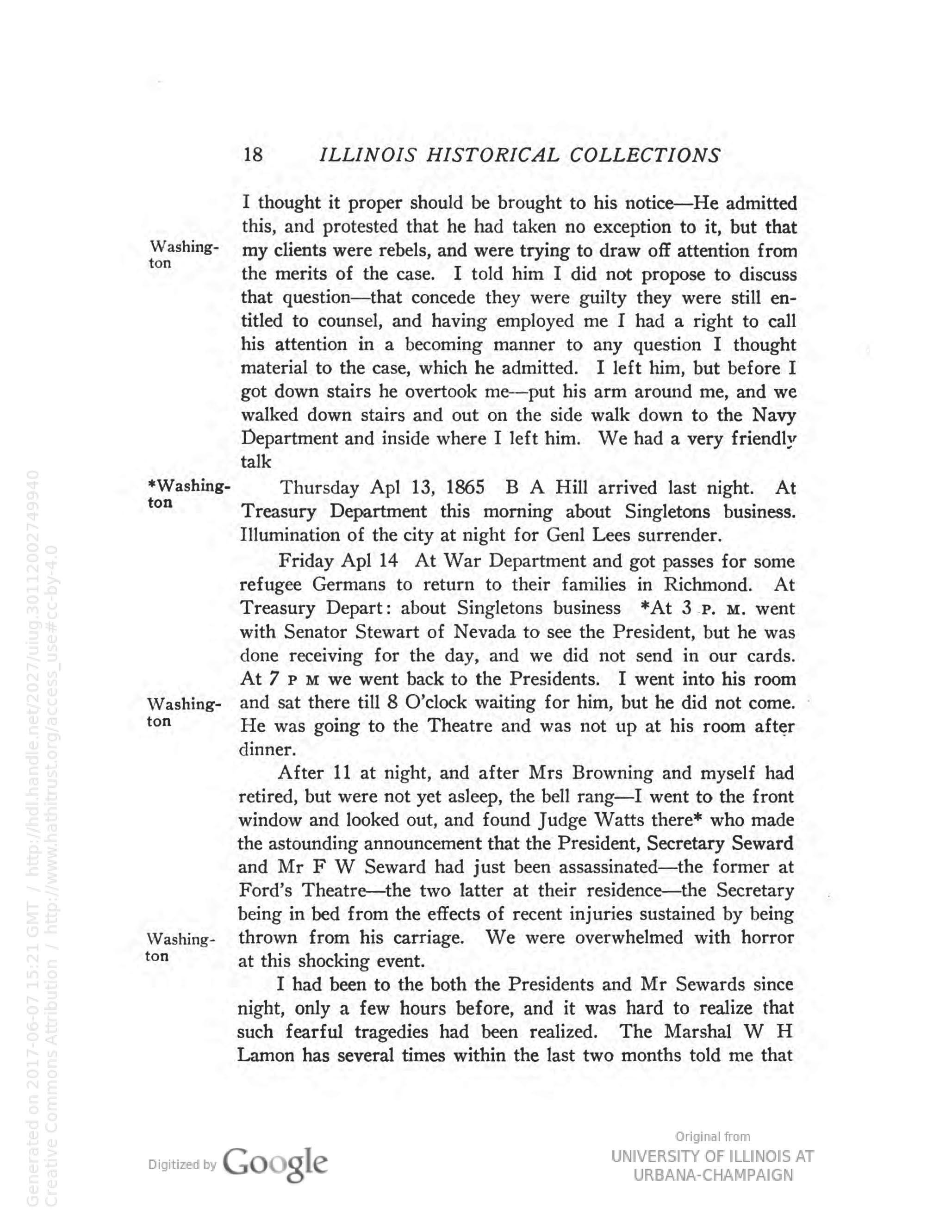
-
Description
These are the diary entries of former U.S. Senator and friend of President Lincoln, Orville Hickman Browning, the day of Lincoln's assassination up to the funeral in Washington, DC on April 19, 1865. Browning discusses how he heard about the attacks and incorrectly states the Secretary of State Seward was killed. He talks about how Lincoln was the South's best ally within the government and speculates who the attacker was. Over the next few days he visits the White House and describes the body of the fallen president. These excerpts are part of the “Diary of Orville Hickman Browning Volume II: 1865-1881,” published in 1925 by the Illinois State Historical Library. Born in Kentucky in 1806, Browning moved to Quincy, Illinois to become a lawyer. Later he served as a U.S. Senator, adviser to Abraham Lincoln and Andrew Johnson, and even a cabinet minister. Browning and Lincoln became friends while serving in the state legislature; both were members of the Whig party. Browning served as an ally for Lincoln during his presidency.
-
Source
Hathi Trust Digital Library
-
Rights
The written permission of the copyright owners and/or other rights holders (such as publicity and/or privacy rights) is required for distribution, reproduction, or other use of protected items beyond that allowed by fair use or other statutory exemptions.
-
Creator
Orville Hickman Browning
-
Publisher
Illinois State Historical Library
-
Date
April 14, 1865
-
Dimensions
22 cm.
from Jan. 1, 1929
"Long, Long Ago" by Clara Clough Lenroot
-
Full Title
"Long, Long Ago" - Memoir of Clara Clough Lenroot, Childhood in Wisconsin
-
Description
Born in 1857, Clara Clough Lenroot was less than 10 years old when President Lincoln was assassinated. This excerpt, from her memoir "Long, Long Ago" published in 1929, highlights her family's reaction to the news as they were moving to their new home in the wilderness outside of Osceola Mills, Wisconsin. Her father, Solon H. Clough, was a lawyer from Fulton, New York who hoped to find fortune out West in the early 1860s. Later in life, Clara married Irvine Lenroot who served in the U.S. House of Representatives from 1909 to 1918 and in the U.S. Senate from 1918 to 1927. Throughout the 1930s their daughter Katharine fought to regulate child labor laws and successfully lobbied for the Fair Labor Standards Act of 1938, which also established a national minimum wage. Katharine also served as third Chief of the United States Children's Bureau.
-
Transcription
In April of that year we moved over to our own farm, about a mile away, and about two miles away from the village of Osceola. I recall one interesting incident of the day on which we took possession of the farm. It was April, 1865. We were driving to our new home. Arriving at a little brook, father drove the horse into the stream to water him. As we waited a man came along on horseback, drew rein on the bridge, and beckoned to father. He drove through the stream, got out of the buggy and approached the man, who spoke a few words to him in a low, earnest voice. Father uttered an exclamation of dismay, and came back and told Mother the astounding news that Lincoln had been assassinated! So was that tremendous news transmitted to us, undoubtedly two or three days after its occurrence, as we had no telegraphic communication. The dreadful news permeated slowly by some such means as it came to us to the remotest parts of the country.
We rode on in silence. We little girls sensed the fact that calamity had overtaken our world. We were hushed by the sorrow in our parents’ faces, and asked no questions. In sad silence we approached the farmhouse that was to be our home, an event which we had anticipated with tremendous excitement and curiosity. Arrived at the little home, father and mother made some pretence of arranging the household goods, but mother soon seated herself upon a bench outside the kitchen door, and tears ran down her face. Father came and sat beside her, wiping his own eyes, and took her hand in his. We children stood around, more and more impressed by their grief. Little was done towards settling the new home that day.
(In sharp contrast to the slow progress of the news of Lincoln’s assassination came the news of President Harding’s death in 1923 to a rural camp in the midst of the pine forest. There a radio set had been installed. Mrs. Claude Luse, alone in her camp near Gordon, Wisconsin, children and maid in bed, was listening to a fine concert being radioed from the Drake Hotel in Chicago. A singer had just begun a solo. She had sung but a few words when the music stopped and a voice said, “We have just had word that President Harding died in San Francisco ten minutes ago; stand by for confirmation.” In a few seconds the statement was confirmed. Mrs. Luse’s neighbor, Mr. Gallaher, starting to town early the next morning, carried the news with him along the route.)
[Transcription by: Kyra S., Dr. Susan Corbesero’s Class, Ellis School, Pittsburgh, Pennsylvania] -
Source
Library of Congress, General Collections and Rare Book and Special Collections Division
-
Rights
The written permission of the copyright owners and/or other rights holders (such as publicity and/or privacy rights) is required for distribution, reproduction, or other use of protected items beyond that allowed by fair use or other statutory exemptions.
-
Tags
-
Cite this Item
Clara Clough Lenroot. ""Long, Long Ago" - Memoir of Clara Clough Lenroot, Childhood in Wisconsin". Badger Printing Company. Remembering Lincoln. Web. Accessed July 7, 2025. https://rememberinglincoln.fords.org/node/1092
-
Creator
Clara Clough Lenroot
-
Publisher
Badger Printing Company
-
Date
1929
-
Dimensions
24 cm.
from Jan. 1, 1929
"Long, Long Ago" - Memoir of Clara Clough Lenroot, Childhood in Wisconsin
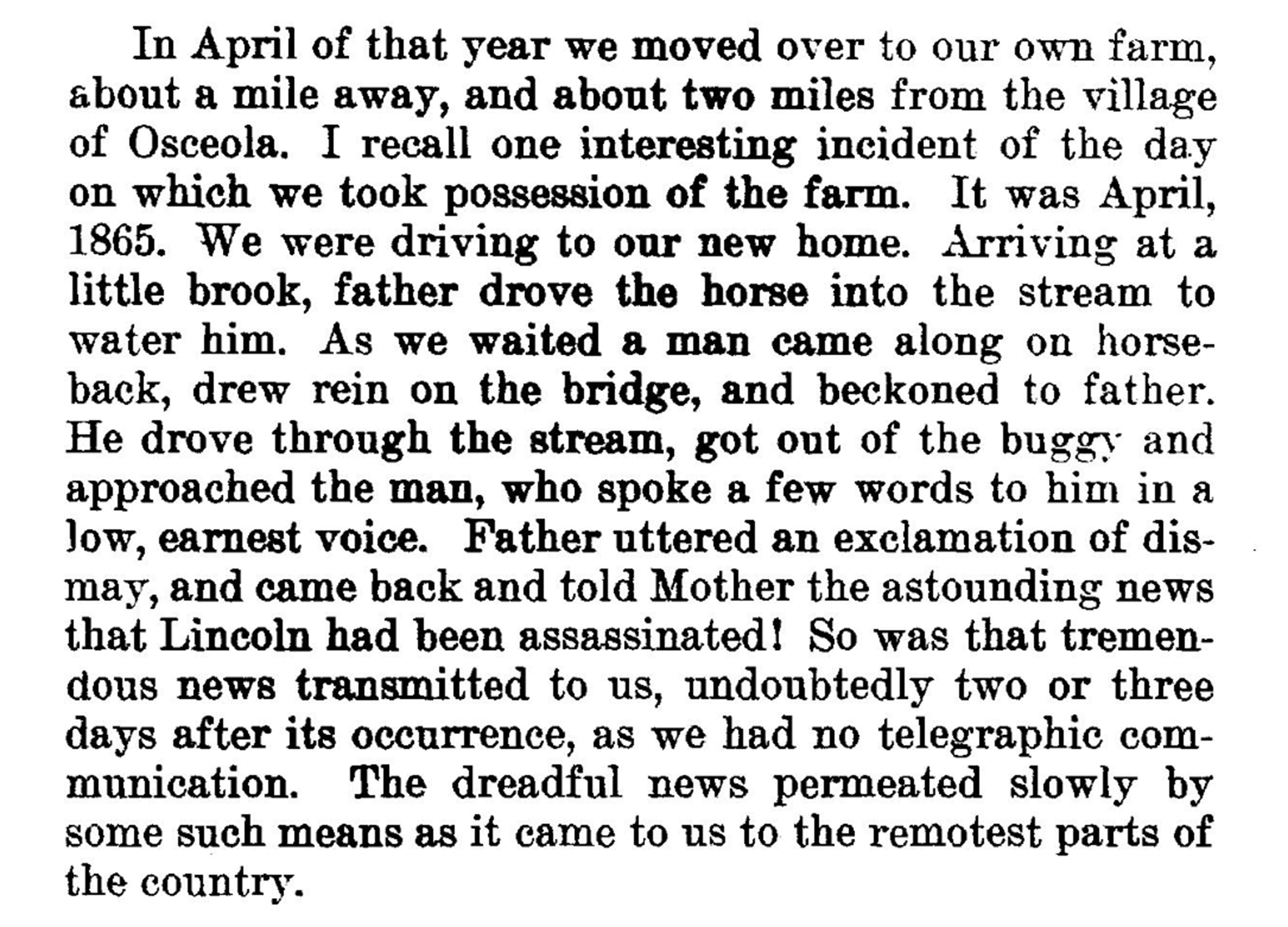
-
Description
Born in 1857, Clara Clough Lenroot was less than 10 years old when President Lincoln was assassinated. This excerpt, from her memoir "Long, Long Ago" published in 1929, highlights her family's reaction to the news as they were moving to their new home in the wilderness outside of Osceola Mills, Wisconsin. Her father, Solon H. Clough, was a lawyer from Fulton, New York who hoped to find fortune out West in the early 1860s. Later in life, Clara married Irvine Lenroot who served in the U.S. House of Representatives from 1909 to 1918 and in the U.S. Senate from 1918 to 1927. Throughout the 1930s their daughter Katharine fought to regulate child labor laws and successfully lobbied for the Fair Labor Standards Act of 1938, which also established a national minimum wage. Katharine also served as third Chief of the United States Children's Bureau.
-
Source
Library of Congress, General Collections and Rare Book and Special Collections Division
-
Rights
The written permission of the copyright owners and/or other rights holders (such as publicity and/or privacy rights) is required for distribution, reproduction, or other use of protected items beyond that allowed by fair use or other statutory exemptions.
-
Creator
Clara Clough Lenroot
-
Publisher
Badger Printing Company
-
Date
January 1, 1929
-
Dimensions
24 cm.
